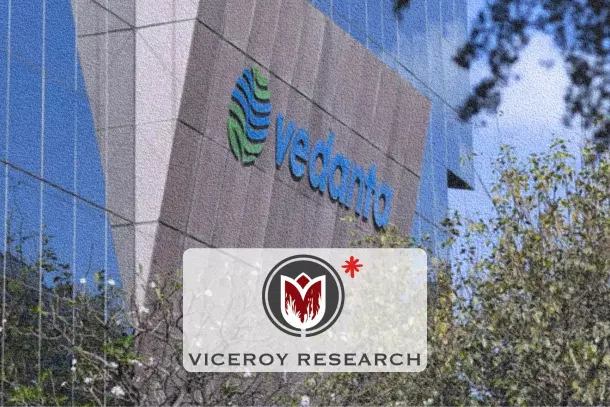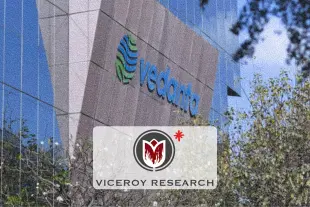Business
Shorting India’s Growth Story: Vedanta, Viceroy, and the Truth in the Footnotes
R. Chandra Mouli
Jul 28, 2025, 06:20 PM | Updated 06:20 PM IST
Save & read from anywhere!
Bookmark stories for easy access on any device or the Swarajya app.


For posterity and prosperity, this could be a motto, maxim, and mantra for retail investors: Before reacting to a sensational disclosure, read the disclaimer first, spot the red flags second, and lastly, do not follow the herd.
Earlier this month, a hitherto unknown research firm named Viceroy, based in Delaware, USA, alleged that the group structure of Vedanta Resources Limited (VRL) was “financially unsustainable, operationally compromised” and was a “severe, under-appreciated risk to creditors.” In an 87-page report, the research firm accused VRL of draining Vedanta Ltd (VEDL), forcing it to take on more debt and deplete its cash reserves.
While Viceroy requires an introduction, VRL does not. It ranks as a global leader in natural resources and technology, with group revenue of USD 18.2 billion. VEDL is currently the Top Wealth Creator among NIFTY 100 companies.
A Short Seller’s Punt and Hunt Strategy
Viceroy is a short seller and research firm combined, and as we delve deeper, we will find out how potent the combo can be. Time and again, its research has focused on financial and governance challenges in listed firms around the world. Some of the exposés, in hindsight, have been proven right.
Hence, should we believe that there is truth in the charges levelled against Vedanta, and Viceroy is justified in comparing the entire operation to a Ponzi scheme?
Let us do a reality check. When taking a punt is your way of life, there is a likelihood some will turn out to be a good bet. But then, corporate India has witnessed instances of a role reversal between the hunter and hunted.
Look back at the Hindenburg saga in the year 2023. The research firm overreached, made the market overreact, and ended up shutting its doors. Not because the business group in focus wanted it that way, but the allegations themselves had too many red flags, which became evident in the market. The resilience of the target company helped to restore the stock price to its prior level within about a year.
Disclaimer: Relevant as Fine Print
The missive from Viceroy worked in a market ecosystem ready to lap up negative news. Investors rushed in the first two days to exit the VEDL stock, leading to a 3–4 percent price drop.
To all those who panicked and others monitoring the stock for a further fall, here's a disclaimer they may have missed out on. The text is extracted verbatim from Viceroy’s website:
“Our reports and any statements made in connection with them are the authors’ opinions, which have been based upon publicly available facts, field research, information, and analysis through our due diligence process, and are not statements of fact... We have a good-faith belief in everything we write;
However, all such information is presented ‘as is,’ without warranty of any kind – whether express or implied... Think critically about our opinions and do your own research and analysis before making any investment decisions.”
The research report questions the brand fees charged to subsidiaries, investment announcements in semiconductors, nuclear and glass substrate, the delays in completion of capital projects, capitalisation of penalties paid for environmental violations, and points out what it deems as several “corporate governance failures.”
Pointing a finger at promoters, the research report wants to know the safeguards in place to ensure that Vedanta Limited acts independently of the holding company’s (VRL) interests.
The corporate communications team of Vedanta has issued a rebuttal on behalf of the Group and has specifically referred to the disclaimers that preface the report. Viceroy has retorted, saying all information is based on their analysis of company financial sources.
As any analyst, auditor, or seasoned equity investor will affirm, financial data, beyond true figures it must convey, is a matter of interpretation, like the age-old adage of viewing a glass as half full or half empty.
Present Day Pied Piper
While Viceroy raises what it believes are valid questions, a contrasting answer is seen in the FY 2025 results of VRL’s group company Vedanta Limited: Highest-Ever Consolidated Revenue at ₹1,50,725 crore; EBITDA at ₹43,541 crore; PAT up by 172% YoY to ₹20,535 crores. Credit rating upgrades from both CRISIL and ICRA to ‘AA.’
The Vedanta Group is the second example in the last two years of being targeted by an overseas research firm. The names of the accuser and accused change every 12 months.
Before we fall prey to a ‘Pied Piper’ approach or rely on misleading information to our detriment, it is more important to examine the root of the allegations from an Indian context, rather than focusing on the company facing the flak.
A Spoke in the Flywheel of Progress?
As a nation, India is building infrastructure in highways, railways and airports in line with global standards. Its stock market attracts the world’s biggest and most discerning investors. Its cities and hinterland have become the remote location for world leaders to set up facilities engaged in IT, ITES, data centres, aviation, defence, automotive and more.
India has emerged as the world’s 4th largest economy, an honour that could not have been envisaged a decade ago. While there are wars, strife and conflict playing out across Europe and the Middle East, India is acknowledged as a stable nation and favourable business destination.
India’s position of strength, its dynamic leadership, and resilient economy is not something everyone will be happy about. The role of detractors, and anti-industry, anti-country and anti-national campaigners is to put a spoke in the flywheel and find ways to disrupt progress.
The Right Context
Such allegations will continue against industrial entities that demonstrate consistent success. Whether investing in shares or offloading your holding, it is critical to evaluate the research firm’s intent, its dual role as a short seller, and the timing of the announcement (same week as the Annual General Meeting of Vedanta Ltd).
At the AGM on 10 July, VEDL stated that the report from Viceroy has no new information that has not been voluntarily shared with shareholders previously, and that its authors have compiled only part information, filled with gross inaccuracies.
Analysts too have commented that the report did not offer fresh insights and has reiterated well-known concerns in an aggressive tone. Global brokerage firm JP Morgan has announced it is not distracted by the claims of Viceroy, and its position remains long on Vedanta and its bond instruments.
Former Chief Justice of India Dr D. Y. Chandrachud, when approached by the Vedanta Group for an independent legal opinion, has said that the Viceroy report “lacks credibility.” Further, he opined that "Viceroy has a track record of taking short positions in listed companies and then publishing misleading reports to profit unlawfully from the resulting market impact."
Advisory firm InGovern, based in Bangalore, has published an analysis titled “Vedanta Under Shortseller Attack” on its website. The firm urges stakeholders to view such reports in the right context and warns that they may reflect the financial interests of authoring firms and emphasise negative interpretations of public data.
InGovern says the typical sequence observed in such cases involves:
Establishing a short position in the securities of a company
Publishing a critical or adverse research report
Amplifying the report’s findings through media and digital platforms
Triggering market reactions, sometimes bordering on panic
Benefiting financially from subsequent movements in stock or bond prices
Looking back, the steps detailed above were evident in the case of Hindenburg. What is unknown to many is that the firm made a profit in its double role of going short on the target company’s stocks even while releasing its research report.
Likewise, it is to be seen if Viceroy, which has taken a short position on debt of Vedanta, will gain from this effort.
If we look closely at information in the public domain, there’s a smarter route to disprove or disagree with Viceroy’s report on Vedanta. For this, one must analyse the credit rating of Vedanta Resources, which will help to validate the credibility of the parent.
Here we go:
VRL is rated by three of the most trusted credit rating agencies in the world — Standard & Poor (S&P), Fitch, and Moody’s. As bankers and bulk investors will affirm, the ratings are ultimate proof of a company’s standing, and the grade can determine the infusion of millions of dollars as investment in bonds or shares in the rated company.
Key factors include the company’s debt outstanding, cash flow, its dealings with subsidiaries, and creditors' position.
As on 3 February 2025, S&P rated VRL as B+, Fitch awarded it B+ as on 20 January 2025, and Moody’s as B1, as on 13 January 2025. The ratings and upgrades are an outcome of VRL’s efforts to lower debt and improve its capital structure, a softening in liquidity, easing of refinancing risks, and successful liability management, as per media reports.
Fitch Ratings, while affirming a “stable outlook,” stated that VRL has “adequate buffers to meet the holdco's liquidity needs in the next 18–24 months, given its improved funding access, and the availability of internal accruals and alternate sources of funding.”
Beyond facts and figures, views and counterviews, a mirror to market perception is an extract from The Morning Context, a non-aligned news portal. While reviewing the Viceroy report, TMC’s Prince M Thomas quotes the founder of an investment firm:
“It seems to be written by an angry kid between two gaming sessions. By using big words, they betray a lazy, rushed approach to make money.”
Thomas says it best in this quotable quip: “Anil Agarwal is a self-declared king of the Vedanta Resources mining empire, not a conman heading a Ponzi scheme. But that’s the picture US-based investigative financial research firm Viceroy Research wants to paint of the billionaire entrepreneur.”
R. Chandra Mouli is a former journalist and advertising professional. Views expressed are his own.





